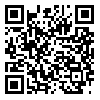Volume 15, Issue 5 (September & October 2024)
BCN 2024, 15(5): 607-616 |
Back to browse issues page
Download citation:
BibTeX | RIS | EndNote | Medlars | ProCite | Reference Manager | RefWorks
Send citation to:



BibTeX | RIS | EndNote | Medlars | ProCite | Reference Manager | RefWorks
Send citation to:
Rezvani Z, Khosrowabadi R, Seyedebrahimi A, Meftahi G, Hatef B. Stress Induction and Release: Electroencephalography Study on Brain Networks and Cortisol. BCN 2024; 15 (5) :607-616
URL: http://bcn.iums.ac.ir/article-1-1764-en.html
URL: http://bcn.iums.ac.ir/article-1-1764-en.html
Zahra Rezvani1 

 , Reza Khosrowabadi2
, Reza Khosrowabadi2 

 , Afrooz Seyedebrahimi2
, Afrooz Seyedebrahimi2 

 , Golam-Hossein Meftahi3
, Golam-Hossein Meftahi3 

 , Boshra Hatef *3
, Boshra Hatef *3 




 , Reza Khosrowabadi2
, Reza Khosrowabadi2 

 , Afrooz Seyedebrahimi2
, Afrooz Seyedebrahimi2 

 , Golam-Hossein Meftahi3
, Golam-Hossein Meftahi3 

 , Boshra Hatef *3
, Boshra Hatef *3 


1- Department of Computer Science, Faculty of Mathematical Sciences, Alzahra University, Tehran, Iran.
2- Institute for Cognitive and Brain Sciences, Shahid Beheshti University, Tehran, Iran.
3- Neuroscience Research Center, Baqiyatallah University of Medical Science, Tehran, Iran.
2- Institute for Cognitive and Brain Sciences, Shahid Beheshti University, Tehran, Iran.
3- Neuroscience Research Center, Baqiyatallah University of Medical Science, Tehran, Iran.
Abstract:
Introduction: Acute stress over a long time period can drastically influence the behavioral and cognitive performances. Therefore, it is important to control and eliminate the stressor after a stressful event. In this regard, understanding of brain mechanism of stress release will help to introduce new practical approaches. In this study, we aimed to investigate the changes in the brain's functional connectivity (FC) patterns and salivary cortisol level during stress induction and release in healthy young male adults.
Method: In this study, 20 healthy young male adults were exposed to stressful events using the Trier social stress paradigm in one session consisting of 23 minutes of psychological stress induction and 20 minutes of recovery, Their stress was measured by the visual analog scale (VAS). In addition, their salivary cortisol levels and electroencephalography (EEG) data were recorded. Subsequently, brain FC maps were prepared in a frequency-specific manner. Then, the effects of inducing and releasing stress on the VAS, cortisol level, and FC were assessed.
Results: The inter-hemispheric FC of the right frontal lobes with other brain regions decreased, while the FC was increased in the left frontal lobes during the induction of stress. Interestingly, the release of stress presented a recovery pattern of inter-hemispheric FC. These changes in FC significantly correlated with changes in the cortisol level.
Conclusion: Our findings highlight the important role of bihemispheric associations in adaptation and coping with stressful conditions.
Method: In this study, 20 healthy young male adults were exposed to stressful events using the Trier social stress paradigm in one session consisting of 23 minutes of psychological stress induction and 20 minutes of recovery, Their stress was measured by the visual analog scale (VAS). In addition, their salivary cortisol levels and electroencephalography (EEG) data were recorded. Subsequently, brain FC maps were prepared in a frequency-specific manner. Then, the effects of inducing and releasing stress on the VAS, cortisol level, and FC were assessed.
Results: The inter-hemispheric FC of the right frontal lobes with other brain regions decreased, while the FC was increased in the left frontal lobes during the induction of stress. Interestingly, the release of stress presented a recovery pattern of inter-hemispheric FC. These changes in FC significantly correlated with changes in the cortisol level.
Conclusion: Our findings highlight the important role of bihemispheric associations in adaptation and coping with stressful conditions.
Keywords: Stress, Visual analog scale (VAS), Cortisol, Electroencephalography (EEG), Functional connectivity (FC)
Type of Study: Original |
Subject:
Cognitive Neuroscience
Received: 2020/04/26 | Accepted: 2020/07/6 | Published: 2024/09/1
Received: 2020/04/26 | Accepted: 2020/07/6 | Published: 2024/09/1
Send email to the article author
| Rights and permissions | |
 |
This work is licensed under a Creative Commons Attribution-NonCommercial 4.0 International License. |





